Meet Our Fellows
First-Year Pediatric Hematology/Oncology Fellows (2024-2027)
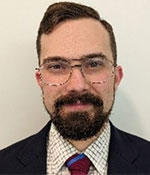
Joseph deBettencourt, MD
Residency: Ann & Robert H. Lurie Children's Hospital of Chicago
Research interests: Patient/provider communication, medical technologies, science communication, pain management
Joseph (Joey), a native Chicagoan, completed his undergraduate degree in theatre at Northwestern University and worked for years as a professional actor and a standardized patient at the University of Illinois Chicago. As a standardized patient, Joey worked alongside medical trainees to hone their communication skills and became inspired to go into medicine. He returned to Northwestern, taking night classes to complete his pre-medicine degree, while continuing to work both as a standardized patient as well as a researcher for a healthcare start-up focused on improving surgical efficiency. He attended Rush Medical College and was inducted into the Alpha Omega Alpha Honor Society and Gold Humanism Society. During his time in medical school, Joey pursued research into communication skills and science communication, publishing studies on post-traumatic stress disorder (PTSD) in pediatric oncology providers and pieces of narrative medicine. He completed residency at the Ann & Robert H. Lurie Children’s Hospital of Chicago. During his time at Lurie, Joey helped design a simulation based program to improve recognition and response to bias in the workplace and performed research on chemotherapy induced cardiotoxicity. His goal is to advance the study and science of how those in medicine communicate with patients and their communities. Joey also enjoys spending time with his wife and son and woodworking.
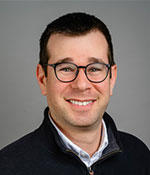
Daniel Echelman, MD, PhD
Residency: Boston Combined Residency Program
Research interests: Complement biology, mechanobiology, drug development
Daniel was raised in Central Massachusetts. He received his bachelor's degree in chemistry from Princeton University and went on to Columbia University to complete his MD/PhD training. During his PhD work with Professor Julio Fernandez, he developed tools for studying single molecules under mechanical force. His research defined how force alters the reactivity of covalent bonds in a bacterial adhesion protein, with implications for how bacteria adhere to tissues under shearing force. He continued his training at the Boston Combined Residency Program (BCRP) in the Integrated Research Pathway, where he worked with Chris Bahl on developing miniprotein inhibitors of the complement system. Following residency, he practiced as a primary care pediatrician at Boston Children's Hospital and worked at a Boston-area biotech on preclinical drug development.
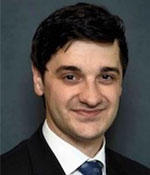
Luke Frankiw, MD, PhD
Residency: Boston Combined Residency Program
Research interests: Cancer immunology, preleukemia and malignant predisposition
Luke was born and raised in Calgary, Canada. He completed his undergraduate degrees in chemistry and bioengineering as part of a combined program between Haverford College and California Institute of Technology (Caltech). Luke then embarked on an MD/PhD at the University of California, Los Angeles (UCLA) and Caltech. He was the final graduate student of Nobel Laureate, David Baltimore, and his PhD work helped uncover the role of mRNA splicing in the regulation of gene expression in immune cells. This work resulted in multiple first author papers in Molecular Cell, RNA, and Nature Reviews Immunology. During his clerkship years, Luke developed an interest in oncology, and he led a research project related to immunotherapy resistance published in the Journal for ImmunoTherapy of Cancer under the guidance of Scott Nowicki. Following medical school, Luke completed his pediatrics residency in the Boston Combined Residency Program in the Accelerated Research Pathway.
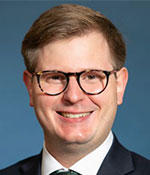
Pietro Miozzo, MD
Residency: Massachusetts General Hospital
Research interests: Medical education, illness communication, outcomes, pediatric palliative care
Pietro is originally from Padua, Italy, and came to the US as a small child, finally ending up in New York City. After middle school, he went to live in Cambridge, United Kingdom, where he attended high school and studied violin at the Royal College of Music in London. He returned to the US for undergraduate studies at Yale University, majoring in molecular, cellular, and developmental biology. In college, he developed an interest in immunology research, working on autoimmune disease research with Dr. Akiko Iwasaki. He then spent a year at the National Institutes of Health as a research fellow, studying B cell metabolism with Dr. Susan Pierce. He returned to New England for medical school at the University of Massachusetts. During residency at Mass General for Children (MGfC), he became interested in serious illness communication, participating in workshops to coach residents in these skills, and medical education, working on the “Tiny Talks” education platform. He also worked with Dr. Lael Yonker, researching immune response to COVID-19 infection and vaccination in children with cancer, as well as Drs. Emily Johnston and Julie Wolfson at the University of Alabama at Birmingham, examining the clinical course and risk factors of children with cancer during a second COVID-19 infection. He subsequently spent a year as a chief resident at MGfC, working as a pediatric hospitalist and enjoying teaching residents and medical students. He lives in Boston with his partner, Emma, a medicine-pediatrics (med-peds) rheumatology fellow at Boston Children's Hospital and Brigham and Women's Hospital, and their mischievous cat, Olive.

Dana Neel, MD, PhD
Residency: Boston Combined Residency Program
Research interests: Cancer epigenetics and chromatin dysregulation, targeted therapeutics for pediatric malignancies
Dana grew up outside of Boston as the middle child of three girls. She went west for undergrad at Stanford University, where she obtained a bachelor of science degree with honors in molecular and cell biology and spent three years in the laboratory of Jerry Crabtree studying chromatin dynamics. She then moved slightly north to the University of California, San Francisco, where she earned an MD and PhD. Her graduate work in the lab of Dr. Trever Bivona revealed that the particular subcellular localization of different oncogenic ROS1 fusion proteins in lung cancer is critical in driving specific oncogenic signaling pathways. She also demonstrated that oncogenic fusions involving certain receptor tyrosine kinases form membraneless cytoplasmic granules that are required for pathogenic RAS-MAPK signaling. She went on to complete her pediatrics residency at the Boston Combined Residency Program, where she participated in the Integrated Research Pathway and re-entered the world of cancer epigenetics through work with Dr. Cigall Kadoch and Dr. Scott Armstrong. She spent the last year as a chief resident at Boston Children’s Hospital. Ultimately, she is working toward a career as a physician-scientist, through which she hopes for a deeper understanding of chromatin dysregulation in pediatric cancers that could open up new avenues for targeted therapies. Outside of the hospital, she enjoys long-distance running and playground-hopping with her two young daughters.
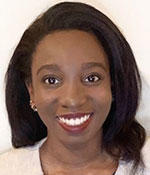
Tolulope Rosanwo, MD
Residency: Boston Combined Residency Program
Research interests: Curative therapy of hemoglobinopathies, erythropoiesis, anemia
Tolu was born in England but grew up mostly in the suburbs outside of Chicago with her Nigerian family, attending the University of Chicago for a bachelor's degree in the biological sciences and Case Western Reserve University for medical school. She interrupted her time at Case to spend two years as a Howard Hughes Medical Institute (HHMI) medical fellow in George Daley's laboratory, successfully modeling sickle cell anemia (SCA) with induced pluripotent stem cells. She is an inventor on a patent from this work. She later returned to Boston to complete residency in the Boston Combined Residency Program for her internship, residency, and chief residency at Boston Children's Hospital. As a resident in the Integrated Research Pathway (IRP), she studied the effects of BCL11A erythroid-specific enhancer editing and hydroxyurea on fetal hemoglobin induction and erythropoiesis with Daniel Bauer. She plans to continue her career as physician-scientist studying how different forms of curative therapy and treatment of SCA impact erythropoiesis and contributors to variability in outcomes for patients. Her specific interest in SCA is born from having multiple family members with the condition. Outside work, she loves playing her cello, HIIT workouts, trying new restaurants, and watching feature films and documentaries.
Second-Year Pediatric Hematology/Oncology Fellows (2023-2026)
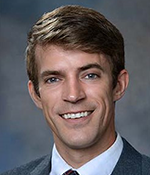
Michael Gundry, MD, PhD
Residency: Boston Combined Residency Program
Research interests: Genome/transcriptome engineering, epigenetic dysregulation in cancer
Michael was raised in Marin County, California, and received his undergraduate degree from the University of California, San Diego. He then spent three years in Dr. Jan Vijg's laboratory at Albert Einstein College of Medicine, researching methods for measuring somatic mutation accumulation. Michael went on to complete his MD and PhD at Baylor College of Medicine, where he trained under Dr. Peggy Goodell. During his thesis work, he developed tools for efficient gene editing of hematopoietic cells and used these tools to uncover the mechanisms by which mutant NPM1 drives leukemogenesis. Michael's research has resulted in five first-author publications in top journals and eight additional co-authored publications. He completed his residency training in the Boston Combined Residency Program in the Integrated Research Pathway, where he worked with Dr. Vijay Sankaran on epigenetic dysregulation in blood cells.
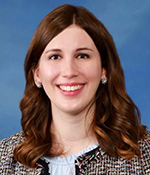
Christy Lucas, MD
Residency: UPMC Children's Hospital of Pittsburgh
Research interests: Patient-reported outcomes, medical humanities, qualitative methods
Christy is a native Pittsburgher and received her bachelor of science degree from the University of Notre Dame, double-majoring in science preprofessional studies (SCPP) and psychology. She attended medical school at Penn State College of Medicine, where she refined her passion for medical humanities and patient-reported outcomes and was inducted into the Alpha Omega Alpha Honor Medical Society and Gold Humanism Honor Society. She completed her pediatric residency at UPMC Children’s Hospital of Pittsburgh. As a student and resident, Christy became interested in looking scientifically at the “non-scientific” aspects of medical care to find what gives patients meaning, initially researching the psychosocial impact of inpatient attire and creating a novel garment called U MATTER®. She seeks to use this framework as a launching point for a career as a pediatric palliative oncologist who seeks to redesign the pediatric cancer patient experience, informed by finding and listening to the voice of a child. Her professional interests include advocacy, the patient experience, medical education, humanities, and narrative medicine, and in her free time, she enjoys spending time with her family, baking, art, and Notre Dame football.
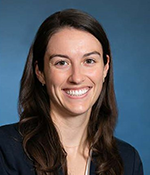
Samantha Martin, MD
Residency: Massachusetts General Hospital
Research interests: Cellular and targeted gene therapies, cancer immunology, health inequities and outcomes disparities in pediatric oncology
Samantha was born and raised in Boston, Massachusetts. She earned her bachelor's degree in organismic and evolutionary biology from Harvard College, where she completed an undergraduate thesis in Dr. Richard Malley’s lab at Boston Children’s Hospital. She then attended the T. H. Chan School of Medicine at the University of Massachusetts, where her love of pediatrics and the city of Worcester was born. During her time as a medical student, she completed clinical research work with the Johns Hopkins Center for Indigenous Health and examined the impact of RSV infection on development of childhood asthma. She completed her pediatrics residency training at Massachusetts General Hospital for Children (MGHfC), where she fell in love with pediatric hematology and oncology. She worked with Dr. Lael Yonker on a project examining immunologic activation in pediatric patients with cancer in response to COVID-19 infection and vaccination. She also completed a clinical research project with Drs. Emily Johnston and Julie Wolfson at the University of Alabama at Birmingham describing a cohort of pediatric patients with cancer and MIS-C, evaluating risk factors and clinical outcomes of this post-COVID syndrome in the pediatric oncology population.
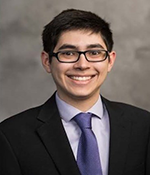
Adam René Pérez Rosenbaum, M.Sc.D
Residency: University of Colorado
Research interests: Health equity, care for families with limited English proficiency, medical education
Adam René received his bachelor of science degree from the University of Notre Dame, studying biology, Spanish, and theology. While there, he overlapped all his interests by studying the ethical responsibilities that physicians have to reach underserved populations. He then went to the University of Michigan Medical School, where he authored a children’s book for siblings of cancer patients. For pediatrics residency, he trained at the University of Colorado, where he helped to create an oncology survivorship clinic specializing in the transition to the adult medical system. To address inequalities in clinical medicine, he developed a simulation curriculum for pediatric residents focusing on this area. He is excited to bring his passions for health equity, family centered care, and care for non-English speaking families to Dana Farber/Boston Children’s.
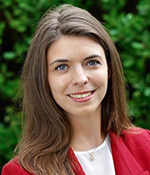
Alba Sommerschield, MD
Residency: Boston Combined Residency Program
Research interests: Targeted- and precision cancer therapy; high-risk, relapsed, refractory pediatric leukemias
Alba grew up in Italy and attended the University of Pavia (Italy) for medical school and the merit-based Institute for Advanced Study (IUSS Pavia) for a parallel master's in biomedical sciences. She graduated with honors and special mention from the board for her clinical research thesis on the use of next-generation sequencing for the identification of myeloid neoplasms with germline predisposition. During medical school she split her time between the hematologic malignancy outpatient clinic at San Matteo Hospital in Pavia and pursuing her interest for basic research in hematology-oncology in the United Kingdom and United States. In Simon Mendez-Ferrer's lab at the University of Cambridge, she studied the mechanisms by which leukemic stem cells co-opt mesenchymal stromal cells for energy and antioxidative defense in acute myeloid leukemia (AML) as a visiting scholar at St. John's College. In Boston, she worked in George Q. Daley's lab on modelling altered T-cell development in Omenn syndrome, a RAG2 immune deficiency, via a patient-derived induced pluripotent stem cells (iPSC) disease-in-a-dish model and correcting the deficiency with CRISPR. After medical school, she returned to Boston to complete pediatric residency training in the Boston Combined Residency Program (BCRP) in the Accelerated Research Pathway. She plans to pursue a career as a physician-scientist in the field of hematologic malignancies, with a research focus on precision-based therapy in pediatric leukemias.
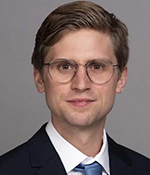
Bjorn Stolte, MD
Residency: Boston Combined Residency Program
Research interests: Studying transcription factor modulation, transcriptional regulation, and phase separation in pediatric cancers
Bjorn earned his MD from the University of Munich in Germany. As a medical student, he completed research training at Dana-Farber Cancer Institute in the laboratory of Kimberly Stegmaier, where he worked with genomic and chemical screening data to identify novel therapeutic approaches to Ewing sarcoma and neuroblastoma. He contributed to work focused on finding genetic dependencies in the TP53 wild type subset of Ewing sarcoma, studying the transcriptionally active cyclin-dependant kinase 12 in Ewing sarcoma cells, and understanding how neuroblastoma cells become resistant to epigenetically-active BET bromodomain inhibitors. His research doctorate thesis earned the highest grade of summa cum laude and was honored with an award for academic excellence by the University of Munich. Bjorn completed his pediatrics residency at the Boston Combined Residency Program (BCRP) at Boston Children's Hospital in the Accelerated Research Pathway (ARP).
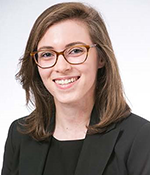
Mary Tabatneck, MD
Residency: Boston Combined Residency Program
Research interests: Neuro-oncology outcomes/late effects, communications research, social determinates of health research
Mary grew up in New Jersey and attended a combined degree (BA/MD) program at Siena College/Albany Medical College with a focus on humanities and community service. While in college, she participated in biochemical research analyzing the structure of histone/protein methyltransferase, PRDM2, and mutant variants. Her research experience combined with various volunteer experiences — particularly working at Double H Ranch, a camp in the Adirondacks for children with life threatening or chronic medical conditions — sparked her interest in pediatric hematology/oncology. Mary attended pediatrics residency at the Boston Combined Residency Program. During residency, she participated in infectious disease clinical research with a focus in immunocompromised patients and health services research. She has a particular interest in neuro-oncology and improving outcomes, communication, and quality of life for patients with brain and spinal cord tumors. Outside of work, Mary enjoys growing house plants, golf, barre/yoga classes, and volunteering with programs such as the Special Olympics.
Third-Year Pediatric Hematology/Oncology Fellows (2022-2025)
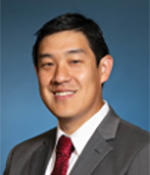
Tim Chang, MD, PhD
Residency: Boston Combined Residency Program
Research interests: Transposons and other repetitive sequences, non-coding RNAs, and epigenetics
Tim received his bachelor of science degree in biology at Stanford University, where he studied the effects of maternal inflammation on fetal neurogenesis. While at Stanford, he became interested in small RNAs, so he went to the University of Massachusetts Medical School to pursue an MD/PhD. For his graduate work in Phillip Zamore’s lab, he studied how piRNAs, germline small RNAs that are created from repetitive sequences such as transposons (endogenous retroviruses), are created and are required for genome stability. While transposons need to be expressed to make piRNAs, unregulated transposon expression leads to mutations and cellular damage. To address this paradox, Tim discovered that the protein Maelstrom is required to safely express these potentially dangerous sequences as piRNA precursors through a non-canonical transcriptional pathway. While at UMass, he was elected to the Gold Humanism Honor Society and fell in love with pediatric hematology and oncology. After medical school, he completed his residency training in the Boston Combined Residency Program (BCRP) in the Accelerated Research Pathway.

Emily Harris, MD
Residency: Boston Combined Residency Program
Research interests: Non-malignant hematology, immune cytopenias
Emily earned a Bachelor of Science in biology from Duke University, where she graduated summa cum laude with honors and high distinction and was selected as a member of Phi Beta Kappa. While at Duke, she worked in the lab of Robert Lefkowitz studying the molecular mechanisms of aortic aneurysm formation in Marfan syndrome and completed a research fellowship at the Duke Institute of Genome Science and Policy, studying genetic factors underlying differential platelet response to aspirin. She attended medical school at Columbia University, where she worked in the lab of Siddhartha Mukherjee studying novel combination therapies for acute myeloid leukemia (AML) and was elected to the Alpha Omega Alpha Medical Honor Society. Emily completed her pediatric residency in the Boston Combined Residency Program (BCRP) at Boston Children's Hospital. Emily has worked on several clinical research projects including studies of pain management in sickle cell disease with Natasha Archer and investigations regarding immune thrombocytopenia with Rachael Grace. She plans to pursue a career in non-malignant hematology.
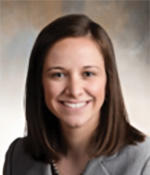
Colleen Kelly, MD
Residency: Boston Combined Residency Program
Research interests: Patient preferences and treatment decision-making in oncology, healthcare disparities
Colleen received a Bachelor of Arts in economics with honors from the University of Notre Dame. After college, she was a management consultant at L.E.K. Consulting, executing growth strategy and M&A projects for medical technology, pharmaceutical, and healthcare companies. In this role, she discovered a love of medicine and completed a post-baccalaureate pre-medicine program at Goucher College. She matriculated to the University of Chicago Pritzker School of Medicine, where she was elected to the Gold Humanism Honor Society and selected as school co-president. Colleen completed her pediatrics residency in the urban health and advocacy track of the Boston Combined Residency Program, where she solidified her interest in pediatric oncology. In medical school and residency, she worked on projects identifying and creating interventions to address healthcare disparities and understanding/eliciting patient and family preferences and aiding in treatment decision-making in oncology. She stayed on for a year as chief resident, with a focus in advocacy education and administrative improvements.
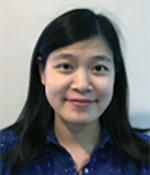
Amy Li, MD, PhD
Residency: Boston Combined Residency Program
Research interests: Altered immune responses in pediatric malignancies, clonal hematopoiesis and immune dysfunction in cancer survivors
Amy received her undergraduate degree in molecular and cellular biology from Harvard College, where she studied innate immune signaling and antigen presentation. She then completed her MD and PhD training at Harvard Medical School and MIT, where she studied T cell immunity in a mouse model of lung adenocarcinoma with Tyler Jacks. In her PhD work, she identified interleukin 33 as a mediator of regulatory T cell differentiation that can impact the balance of anti-tumor immunity in the tumor microenvironment. Her work led to a publication in Cell Reports, as well as co-authored publications in Immunity and Cell. She completed her residency training in the Boston Combined Residency Program in the Accelerated Research Pathway, and during that time, she has pursued interests in immune dysregulation and reconstitution in pediatric leukemia patients with Yana Pikman.

Cory Rillahan, MD, PhD
Residency: Boston Combined Residency Program
Research interests: Genetic and small molecule screening to identify novel therapeutics and chemical probes
Cory grew up in Massachusetts and attended Tufts University, where he majored in biochemistry. He then conducted his PhD in chemical biology at the Scripps Research Institute, where he developed small molecule inhibitors and chemical probes for the study of carbohydrate biosynthetic enzymes and carbohydrate binding proteins. This work resulted in many first in class molecules, some of which are commercially available and widely used by the research community. With a growing interest in cancer biology and therapeutics, Cory conducted postdoctoral research at Memorial Sloan Kettering Cancer Center, where he received a leukemia and lymphoma postdoctoral scholarship for his work on acute myeloid leukemia (AML) and Ph+ B-ALL. Working closely with physician scientists and seeing the rapid advancement and application of genomics for targeted therapies, he decided to attend medical school with the intention of using his patient interactions to fuel his research.

Rebecca Sutherland, MD
Residency: Children's Hospital of Philadelphia
Research interests: Translational research in liquid oncology and bone marrow transplant, early phase clinical trials
Rebecca received her Bachelor of Arts in biology with honors from Williams College. Prior to medical school, she studied stem cell engraftment and globin switching as a research assistant in Dr. Leonard Zon’s lab. Rebecca attended the University of Connecticut School of Medicine, where she was elected to Alpha Omega Alpha and awarded the Faculty Award for Overall Academic Excellence. As a medical student, Rebecca built upon her clinical interest in oncology through a summer research fellowship at Memorial Sloan Kettering Cancer Center, where she studied combinatorial mutations implicated in leukemogenesis. Rebecca completed her pediatrics residency at the Children’s Hospital of Philadelphia. During residency, Rebecca pursued an advanced skill in clinical research while studying the outcomes of patients with infant acute lymphoblastic leukemia who underwent stem cell transplant.

Cary Weiss, MD, PhD
Residency: Boston Combined Residency Program
Research interests: Epigenetic dysregulation, malignant predisposition, pediatric solid tumors
Cary received his bachelor’s degree with honors in biology and in environmental studies at New York University prior to graduate school. He then completed his MD and PhD in cell biology at the Albert Einstein College of Medicine in Bronx, NY. There, under the guidance of Keisuke Ito, he described the mechanism through which microRNA-22 regulates megakaryocyte differentiation. In subsequent work with Art Skoultchi’s laboratory, he identified the role of linker histone H1 in chromatin compaction through patterning of specific epigenetic marks. His work led to several publications, including articles in Nature and Blood Advances. Cary has served as editor-in-chief of EJBM, a student-run peer-reviewed biomedical journal. He completed his pediatric residency training in the Boston Combined Residency Program (BCRP) in the Accelerated Research Pathway. His interests are in malignant predisposition, and the role of chromatin architecture and epigenetic dysregulation in malignant transformation.
Fourth-Year Pediatric Hematology/Oncology Fellow (2021-2025)

Geoffrey Smith, MD, PhD
Residency: Boston Combined Residency Program
Research interests: Pediatric solid tumors, chemical biology, immuno-oncology, and tumor microenvironment
Geoff received his undergraduate degree in chemistry from Harvard University before working in industry prior to graduate school. He then completed his MD and PhD in chemical biology at the University of California, San Francisco, studying cytokine signaling with Jack Taunton and Art Weiss. In his PhD work, he identified a new JAK3 kinase inhibitor and used it to characterize the consequence of JAK3 inhibition in IL-2 signaling. He collaborated to apply the inhibitor to several therapeutic areas, including graft-versus-host disease (GVHD) and ETP-ALL. He also uncovered differences in CD4 and CD8 T cell IL-2 signaling dynamics that contribute to their distinct proliferative responses. His research has led to multiple publications, including articles in Science Signaling, Nature Chemical Biology, and eLife. In medical school, he developed a love for pediatric oncology while doing a longitudinal oncology clinic and oncology sub internships at University of California, San Francisco and Boston Children's Hospital. He completed his residency training in the Boston Combined Residency Program (BCRP) in the Accelerated Research Pathway. He was a co-leader of the Academy of Basic and Translational Investigation, the BCRP’s community of physician scientists.

 Translate
Translate